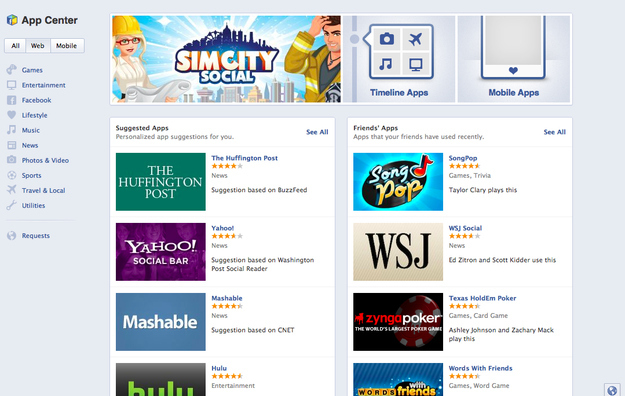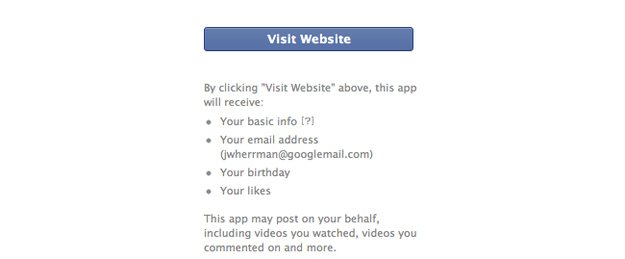Browsing a typical app store, a user's calculations are no more complicated or difficult than a brick-and-mortar shopper's:

1. What are these things?
2. How much do they cost?
3. Should I buy them?
4. Ok, I have bought something, here it is
Stores offer things that add something to your life in a very literal way. Walking into a store, or opening an app store, we intuitively understand what to do, how it works, why we're there.
Perhaps the name should have been a clue, but Facebook's App Center isn't a store. It looks like an app store, and it functions like an app store. It's been touted as an app store. But it doesn't feel like a store, and not just because all the apps are free. Look at this:

If your mind interprets this as a storefront, you'll have a headache after the first click. There are products here — actual apps, mostly games — but there are lots of other things, too. Some of these things are complex sharing tools. Some are entirely new interfaces for other sites. Some, maybe most, are just widgets that share some small new sliver of your online activity with other people on Facebook. They're not nearly apps — they're little more than site-specific privacy settings.
The net effect is weirdly jarring. The old, almost instinctual retail calculation doesn't work here. Instead, you're processing something like this:
1. What are these things?
2. No really, what are these things?
3. Wait these are all free
4. Oh, I see
5. So what exactly am I giving up here
6. Oh, cool, a game
7. Wait what happened
8. Help
Take the Hulu app. It was both popular and recommended to me by Facebook, so I installed it. I like Hulu! So I should probably get the app, right? I click the icon, which takes me to the app page. The descriptions reads:
Connect your Facebook account with Hulu to see what your friends are watching, share what you watch with your friends and improve your recommendations.

There's no "install" or "add" button, just a "Visit Website" button, which I clicked. It took me to Hulu. Anndd... wait, that's it? The app had installed and I had nothing to show for it. The only definition by which that is an app is one that Facebook has written itself.
When it was announced, I was convinced that the App Center was a savvy play. It seemed like a sort of index of permissions slips that would make what Facebook is doing — inserting itself between you and the rest of the internet — more explicit and honest, and therefore more palatable. The WaPo's frictionless sharing was annoying because it felt like a trick. Installing an app from a "store," however, is intentional
Instead, it feels like an insult to users' intelligence, or a taunt. It's less a storefront than a gallery of all the tricks companies have devised to slip their way into our newsfeeds; companies that are now so bold as to assume we would have opted into their apps had they not literally kept us from seeing what our friends are doing.
App Center is the nexus of every little thing that's made us uneasy about Facebook over the last two years; it's a peek into the process why which Facebook is trying recontextualize the internet around it as something inside of it, an idea that's transformative and powerful when discovery and context help an site's experience, but which feels devious and cynical when it's not. It assumes you're comfortable thinking of every other page on the internet as a Facebook app, whether or not you are. Clearly Facebook is.
Regardless of how you feel about Facebook and the FUTURE OF THE INTERNET, calling this an "app" center is manipulative and often simply not accurate. Which is all made worse by the fact that App Center is actually kind of a great place to find games. Oh well.
